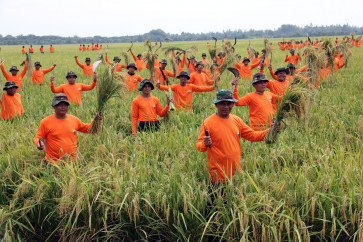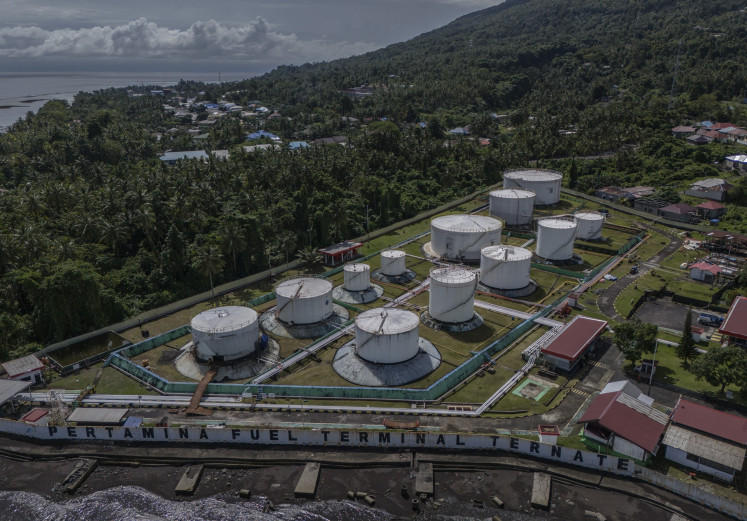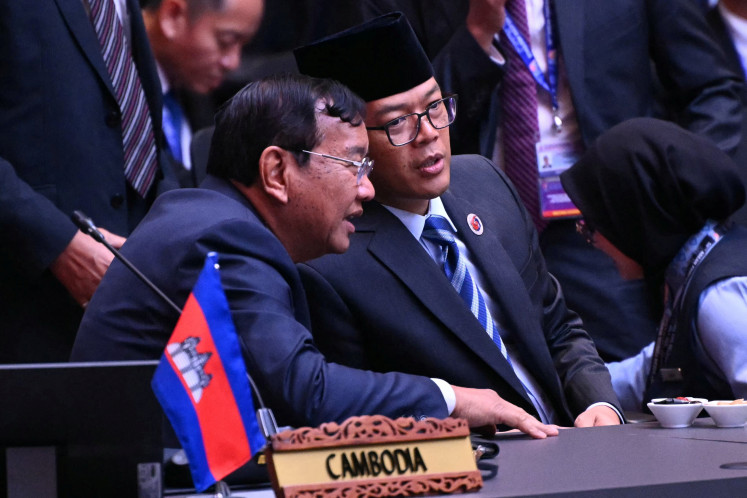Popular Reads
Top Results
Can't find what you're looking for?
View all search resultsPopular Reads
Top Results
Can't find what you're looking for?
View all search resultsDiscourse: President will tour regions to promote omnibus bill on job creation: Airlangga
Airlangga Hartarto - Coordinating Economic Minister (JP/Wendra Ajistyatama)President Joko “Jokowi” Widodo’s administration submitted the controversial 1,028-page omnibus bill on job creation to the House of Representatives on Feb
Change text size
Gift Premium Articles
to Anyone
Airlangga Hartarto - Coordinating Economic Minister (JP/Wendra Ajistyatama)
President Joko “Jokowi” Widodo’s administration submitted the controversial 1,028-page omnibus bill on job creation to the House of Representatives on Feb. 12, expecting the deliberations to conclude within 100 working days.
The Jakarta Post’s Nezar Patria, Esther Samboh, Adrian Wail Akhlas and Margareth S. Aritonang recently sat down with Coordinating Economic Minister Airlangga Hartarto to discuss how the omnibus bill on job creation will ease doing business, attract investors, create jobs and boost economic growth.
With protests becoming increasingly virulent from labor unions to environmentalists and human rights groups to regional governments, Airlangga said that public objections could be delivered to the House, which is in charge of deliberating the bill. President Jokowi and the government will also tour regions across the country to raise awareness and public understanding of the bill. Below are edited excerpts from the conversation.
Question: We understand that the omnibus bill is expected to improve Indonesia’s ease of doing business (EODB) ranking, based on the World Bank’s famous index, from the current level of 73rd among 190 countries. But how about job creation, investment and economic growth targets from this job creation bill?
Answer: The 2020-2024 National Medium-Term Development Plan (RPJMN) has set an economic growth target of 6 percent. To reach the 6 percent figure, we need faster decision-making, faster licensing processes and to ease the doing of business for small and medium businesses.
To reach the growth target, we will need to attract investment of Rp 1.2 quadrillion (US$87 billion) per year. Under a business-as-usual scenario, we could only attract Rp 800 trillion to Rp 900 trillion at most. So we need to attract an additional Rp 300 trillion in investment per year.
Under a business-as-usual scenario, around 2 million to 2.5 million jobs are created every year. We now aim to increase the number to 3 million jobs, from sectors such as manufacturing, start-up companies and part-time workers.
To reach a growth target of 6 percent, we need everything to move in motion. If it’s not quick enough there will be a lot of job and project opportunities that are delayed.
The omnibus bill will open up financing access for small and medium businesses so they can formalize their businesses without having to have Rp 50 million to hand. Meanwhile, cooperatives can also be established by only three people. Once the small and medium enterprises are listed as limited liability companies (PT) or cooperatives, access to bank financing will be opened, as well as to other government assistance programs such as the micro credit (KUR) program. This will transform the informal sector into a formal one.
The omnibus bill on job creation will affect many lives in Indonesia. However, there are many civil society groups that feel left out of the bill’s formulation process, especially labor unions, regional governments and environmental organizations, among many others. What is your view on this?
The inclusion of the public will happen during public hearings at the House of Representatives. That is the official process at the House, to gather as much information as possible, so that House factions can use this to create a problem inventory list (DIM).
In drafting laws, drafts come from either the government or the House. In the case of this job creation bill, it is the government’s initiative and we have also asked for input from ministries and government agencies. If the law is the House’s initiative, the government provides input. To pass bills into law, there needs to be agreement between the government and factions within the House.
In 2003 during the deliberation of the Labor Law, the process was the same. We have also communicated with labor group representatives. If they are looking for a compromise, go to the House. Every person who objects can go to the House. Even if some labor representatives choose to leave the coordination team (initiated by the government to discuss the omnibus bill) there’s no problem. We are taking input from official and unofficial channels. The process is at the House. The House is the one to chase and to lobby.
There are concerns that the government and the House will pass this bill anyway despite objections from elements of the public, as the ruling coalition controls nearly 75 percent of the seats in the House. What is your view?
There is no bill where everyone agrees during deliberations at the House — some come with revisions, others total revisions. There are always cases in which we share the same interpretation but there are also cases where there are multiple interpretations. The most important thing is that these disparate views can be aligned. That’s why it’s of the upmost importance that there is a unified understanding of laws.
Regional governments organized a meeting at the BKPM [Investment Coordinating Board] recently and there will be a government roadshow, with even the President disseminating information the same way he did with the tax amnesty.
There are also concerns that the bill will strengthen the central government’s role while weakening the House as well as the regional governments’ role. What is your take?
Business licensing has long been the responsibility of the BKPM, even before the omnibus bill on job creation. This is the most important thing that the BKPM has been assigned — the one-door licensing system. In the past it was through the PTSP [one-stop integrated services] and now the OSS [online single submission]. Add those with the Inpres [Presidential Instruction No. 7/2019 on acceleration of the ease of doing business], which allows for a tax holiday fiscal facility to be handled by the BKPM as well.
At the moment, the licensing process at the BKPM requires a lot of recommendations from multiple parties — from governors, regents, regional agencies — the processes of which are different from one another. There’s no standard. Some investors take care of mining licenses in two years, some three years. The business classification determined by one region to another could be different. So what we’re doing is not taking any authority away but standardizing the level of service across Indonesia.
Meanwhile Article 170 is related to the prevailing laws, where the government will be granted the flexibility to amend laws and regulations if needed. The way our executive system works is that the public elects the president and the president is the one to take responsibility.
We don’t want policies taken by ministries, or others, becoming the burden and the responsibility of the president, when the regulations are not issued by the president. Therefore [ministry- or lower-level regulations] can be amended. In the past we saw inquiry rights being adopted by the House because of regulations and policies issued by ministers. That’s why. This route is the way to safeguard harmonization.










